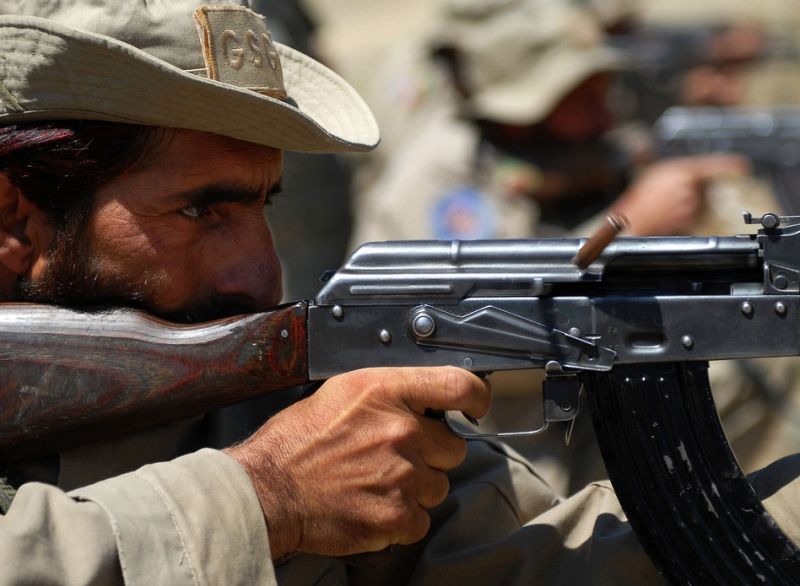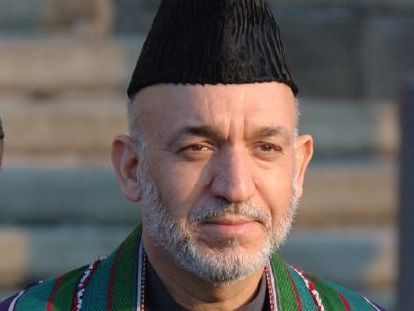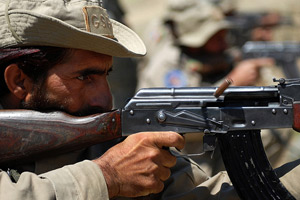The State Department press aide hinted at some kind of bureaucratic snafu. The invites had only gone out at the last minute. As a result, David Samuels (author of this epic piece on Balkan jewel thieves and a Mother Jones contributor) and I found ourselves the lone journos at a media roundtable featuring a handful of members of the Afghan cabinet who’d accompanied President Hamid Karzai on his visit to Washington this week. Among them were General Abdul Rahim Wardak, the country’s dour and barrel-chested defense minister; Wahidullah Shahrani, the youthful looking Minister of Mines; and Omar Zakhilwal, the Minister of Finance.
The event started late and ended abruptly a short time later, with the Afghan officials ushered out of the room by their handlers and shepherded on to their next appointments. And strictly speaking the roundtable portion never actually took place. But for about 15 or minutes or so I was able to chat with officials including Minister of Interior Haneef Atmar and Mohammad Masoom Stanekzai, the former Afghan communications minister and currently a top security advisor to Karzai.
I already highlighted Atmar’s comments on private security companies, but he was also eager to discuss the strides that have been made in combating corruption—successes, he griped, that have not received “the kind of attention that they should.” Over the past year, he said, more than 200 police officers have been prosecuted on corruption-related charges. And he noted there has been a major crackdown on illegal roadblocks set up by police to “toll” (i.e., extort) passerby. “Our main roads and highways are much more conducive to travel.” He also pointed to the ministry’s fledgling Major Crimes Task Force, set up in partnership with the FBI to pursue high-level corruption cases. “It is a success story in terms of building an organizational framework to address the problem. It has yet to produce the desired result. It’s a very, very young organization.”
I asked Atmar whether he thought the US government was doing enough to police its own contractors. “The good news is that the US has started to look seriously to its contract issues and we are grateful for that,” he said. “It’s not the issue of blaming each other. We know there is corruption and corrupt practices both by the Afghan administration and in the ranks of these contractors providing services to the people of Afghanistan. Now what’s important is the seriousness of the two nations, of the United States and Afghanistan, working together on this issue and hopefully producing results.”
Stanekzai added that he expected the US government’s decision to channel more assistance through the Afghan ministries—rather than through lengthy contracting chains—might leave “less room for those contractors to manipulate.”
Stanekzai has one of the Karzai administration’s toughest jobs. He’s heading up the nascent Taliban reintegration and reconciliation process, which entails both coaxing lower-level militants to lay down their arms and rejoin Afghan society (reintegration) and negotiating with high-level leaders to join the political process (reconciliation). The Obama administration has supported the reintegration part of the strategy—but up until recently has expressed concerns with the more risky reconciliation aspect, which entails dealing with unsavory figures who have the blood of US and coalition soldiers on their hands. After meeting with Karzai at the White House on Wednesday, however, President Obama offered his qualified support for negotiations with the Taliban.
“There are some basic red lines that we all agree on,” Stanekzai explained. “Those who want to join with the peace process, they should renounce violence. Links with Al Qaeda should be cut and any decision that we make it should not undermine the rights of others—the woman, the minorities or other groups.”
But the X factor, he added, is Pakistan, whose tribal areas are a haven for militants plotting attacks in Afghanistan. “Real reconciliation cannot take place” until the issue of “sanctuary” is dealt with, he said. “Once that support is cut there is bigger room so that reconciliation and reintegration both at the top and at the lower level can take place.” He told me he believed the “peace jirga” Karzai plans to convene later this month would provide additional momentum to the strategy.
For those expecting too much, too soon out of Afghanistan, though, he cautioned patience. Peace, he said, “is a process, it is not an event.”
















